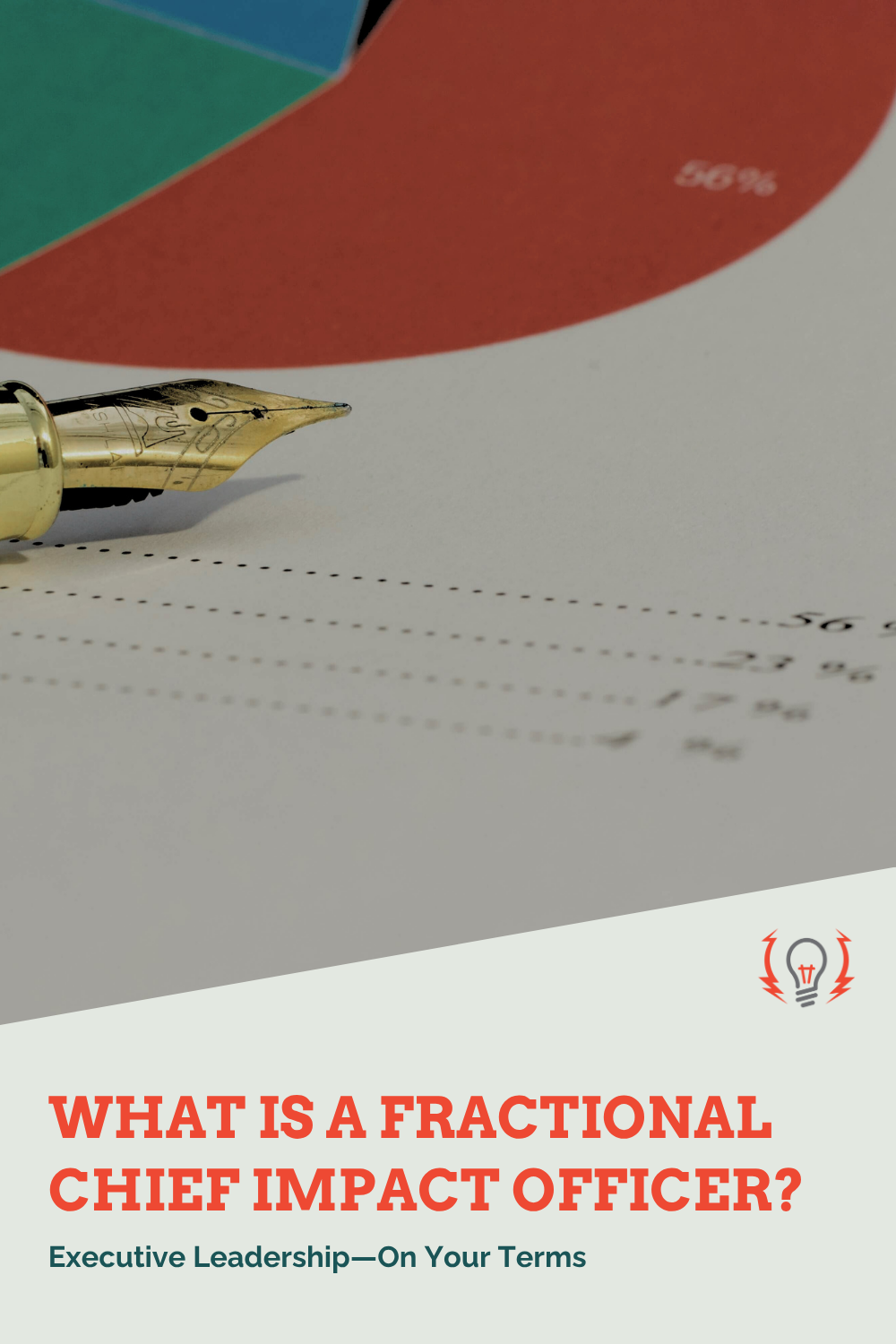If leading a nonprofit or social enterprise feels like constantly putting out fires, you are far from alone. The stakes are high—your team is passionate, your mission matters, and the expectations from board, funders, and partners keep stacking up. But with shrinking budgets, ambitious goals, and even layoffs or funding cuts on the rise, small teams are being asked to do more than ever.
It’s easy to feel stretched thin, wishing for expert support but knowing a full-time executive just isn’t feasible right now.
Here’s the hopeful pivot—your organization doesn’t have to settle for staying overwhelmed. Imagine what’s possible if, instead of constantly juggling, you finally had clarity, credible strategy, and the bandwidth to deliver measurable results.
That’s where the Fractional Chief Impact Officer comes in—a flexible, approachable, and proven way to amplify your impact, even when resources and time are tight.
What Does “Fractional” Mean?
Executive Leadership, On Terms That Fit YOU
The concept of “fractional” leadership is about bringing in experienced executives—like a Chief Impact Officer—on a part-time, hourly, or project basis.
This approach allows growing organizations to access high-level strategy and support, without the weight, risk, or commitment of a full-time hire. Engagements may range from a few hours each week to time-bound projects focused on solving specific challenges, like launching a new reporting system or securing B Corp certification.
Other terms you may have heard for this model include:
Interim executive
Part-time executive
Embedded advisor
Contract leadership
While “fractional” is most current, outdated terms like “advisor” (or sadly even “board member”) usually point to roles with less influence—fractional leaders are integrated and accountable, not just giving advice now and again. And while freelancers typically tackle tasks or deliverables from the sidelines, fractional executives join leadership, shape direction, and guide implementation hand-in-hand with your team.
Why Choose Fractional CHIEF IMPACT OFFICER Services?
When resources are limited but the need for credible, strategic leadership is pressing, fractional services stand out because they are:
Project-based or hourly: Customized to capacity.
Scalable: Flexible engagement, ramping up or down as priorities shift.
Mission-aligned: Tailored to the organization’s culture, growth stage, and values.
Quickly actionable: Expert guidance starts fast, and adapts as you learn.
a Chief Impact Officer: Where Mission Meets Measurable Results
A Chief Impact Officer (CIO) is more than a champion for your purpose—they’re the architect of your mission’s outcomes. This role ensures your work leads to proven, communicable social and environmental results, empowering every department to pull in the same direction.
In practical terms, CIOs:
Set strategy for measurable, sustainable impact
Align staff, systems, and stories with your biggest goals
Lead the design and implementation of evaluation tools
Build trust by making impact data visible and honest
From Vision to Data—And Beyond
Fractional CIOs work alongside your leadership, filling gaps and tackling the priorities that matter most in your context.
Popular Fractional CHIEF IMPACT OFFICER Projects
Impact Reporting: Create “stakeholder-ready” reports, translating mission work into clear, funder-friendly results and narratives.
Strategy Design: Develop frameworks for social/environmental impact, identifying short- and long-term markers of success.
Stakeholder Engagement: Build or refine outreach and transparency tools to boost credibility and support.
Organizational Alignment: Make sure goals, departments, and programs work together, not in silos.
Funding Support: Strengthen proposals with transparent data, helping you win more grants and opportunities.
Measurement and Evaluation: Pinpoint which data is meaningful, make it easier to collect, and free your team from endless spreadsheets.
Impact Storytelling: Convert numbers into compelling, jargon-free stories your community and partners care about.
ESG and Sustainability Integration: Weave social/environmental impact throughout your business model, supporting certifications like B Corp.
Capacity Coaching: Guide staff in strategic, sustainable thinking, building a stronger, impact-literate culture.
Projects may be structured hourly, by retainer, or as one-time strategy sprints—so support meets your needs, not the other way around.
Why Now? Small Teams Are Asked to Do More
The last few years have made one thing clear: Nonprofits and social enterprises face ever-growing expectations with fewer resources each quarter. Layoffs, budget cuts, and evolving goals mean organizations are relying on small, agile teams—and those teams are pressed to deliver transparency, results, and growth without burning out.
That’s exactly why Fractional Chief Impact Officers matter now. They offer hands-on partnership in systems, data, and culture—so your staff is set up to succeed, your mission gets the attention it deserves, and your community can see real change.
Who Needs a Fractional Chief Impact Officer?
Fractional leadership is perfect for:
Small teams with powerful missions trying to scale without overextending staff
Founders and EDs juggling strategy, reporting, and daily operations
Social enterprises and nonprofits pursuing grants, certifications, or impact recognition
Boards recognizing that their impact story is scattered and unclear
If measuring, reporting, or scaling impact are real challenges—or if your staff is burning out covering too many bases—fractional leadership is a great option for you.
The Benefits of Fractional Impact Leadership
Immediate Value, Ongoing Flexibility
With fractional CIO services, mission-driven organizations receive:
Targeted expertise right when it’s needed: No complex hiring processes or long-term contracts
External perspective with insider accountability: Best practices and fresh ideas, without disrupting culture
Strategic clarity that reduces overwhelm—systems, frameworks, and alignment so every hour is well spent
Personalized guidance: Support is tailored to your goals, whether helping with a report deadline, capacity building, or stakeholder communication
How It Works: Your Fractional CIO in Action
A typical engagement with me unfolds like this:
Discovery: Free 30-minute consult to get to know your challenges, goals, and context. This also allows us to make sure we’re a good fit for each other.
Proposal and Planning: Right-sized project or strategic retainer mapped around needs and capacity.
Then, depending on the project, it may include:
Systems and Reporting Build: Design measurement tools, streamline data collection, and turn insights into usable, actionable knowledge.
Frameworks and Coaching: From impact strategy to storytelling tools, every solution is co-created for your top priorities.
Ongoing Leadership: Regular check-ins, accountability, and continuous improvement—on your terms, in your preferred mode (remote, onsite, hybrid).
Everything is collaborative, transparent, and tailored. As your partner, I am your executive extension, leveling up—not overwhelming—your mission.
How Can a Fractional Chief Impact Officer Help You?
If reporting deadlines cause stress, strategic priorities seem endlessly shifting, or the weight of demonstrating impact is slowing your mission’s growth, fractional CIO services can clear the fog.
Choose from hourly, project, or recurring support, and get help that lifts you—never overburdens.
Measure progress in ways that motivate and inspire
Communicate outcomes that build trust
Coach teams for lasting, positive change
Move from “overwhelmed” to “outcomes” with help that fits you
Next Steps: Ready to Transform Your Impact?
Your mission deserves to be seen, measured, and celebrated. All it takes is a willing partner, proven systems, and a commitment to clarity—so your impact can speak for itself.
Ready to discover if fractional leadership is right for you? Book a free consult and move from scattered effort to strategic growth—no pressure, just possibilities.
There’s never been a better time to get the help you need—on your terms, so everyone in your organization can do good, even better.
PIN THIS POST FOR LATER:
I’m Kristi Porter, and I help cause-focused organizations move from scattered efforts to strategic growth. As your Fractional Chief Impact Officer, I’m here to help you measure what matters, communicate results, and maximize your mission—all on your terms and budget. When you go from overwhelm to outcomes, you can do good even better.

































